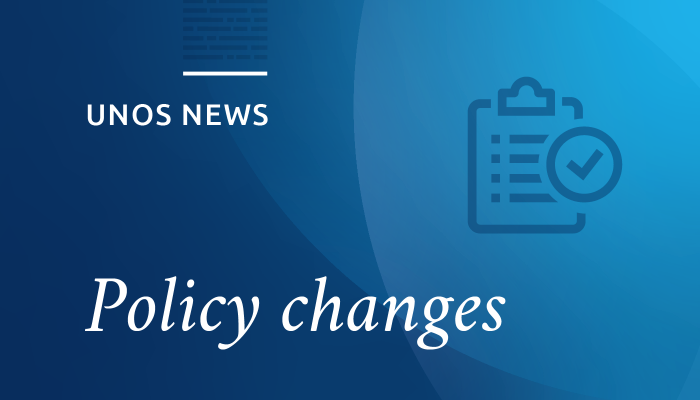Audience
- Kidney Paired Donation Primary Contacts
- Kidney, Liver and VCA Living Donation TX Program Administrators/Managers, TX Program Directors, TX Program – Clinical Coordinators, Compliance Officers, Social Workers-Tx Program, Compliance Officers, Quality Coordinators, Quality Directors/Managers, Support Staff Clinical, Independent Living Donor Advocates
- Kidney, Liver and VCA Living Donation Program Administrators, Primary Physicians, Primary Surgeons, Primary Donor Surgeons-Open Nephrectomies, Primary Donor Surgeons-Laparoscopic Nephrectomies, Primary Clinical Consultants
Implementation date
July 26, 2022
At-a-glance
Four exclusion criteria in OPTN Policy 14.4.E Living Donor Exclusion Criteria have been updated to align with current research and guidelines as well as ensure consistency throughout OPTN policy language. These changes give transplant programs more autonomy when evaluating individuals with malignancies and type 2 diabetes for living donation. Read the policy notice.
Additional information
Updates to OPTN policy language impact four living donor exclusion criteria:
- Malignancy exclusion criterion
- Policy specifies that individuals with malignancies that require treatment, other than surveillance, or have a more than known minimal risk of transmission are excluded from being living donors
- Diabetes exclusion criterion
- Policy maintains type 1 diabetes as an absolute contraindication to living kidney donation
- Policy specifies that individuals with type 2 diabetes that have evidence of end organ damage or unacceptable lifetime risk of complications as determined by a transplant program’s individualized assessment of donor demographics and comorbidities are excluded from being living kidney donors
- Coercion exclusion criterion
- Language aligns with other references in OPTN living donor policy
- Illegal exchange exclusion criterion
- Language aligns with other references in OPTN living donor policy
What you need to do
The updates to living donor exclusion criteria do not require transplant programs to change their living donor and acceptance practices.
Should a transplant program choose to expand their living donor evaluation and acceptance practices, there may be additional administrative burden for the program to adapt evaluation protocols.
Education and resources
Professional education is available on this policy change in UNOS Connect.
- DON107: Living Donor Exclusion Criteria
The OPTN Board of Directors approved this policy change at its June 2022 meeting. Visit the OPTN public comment page for this proposal or read the policy notice to learn more.
Questions?
For policy-related questions, contact [email protected]

